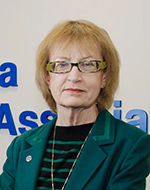Page Content
The round of tripartite discussions between the Government of Alberta, the Alberta Teachers’ Association and the Alberta School Boards Association that ended earlier this year go back to 2011. Featured here is a selection of articles (reprinted in whole or in part) from the ATA News and chronicling events of 2011 to 2013.
2011
1. January 25, 2011
Discussions regarding the future of collective agreements
ATA President Carol Henderson
The Alberta government has requested that the Alberta Teachers’ Association and the Alberta School Boards  Association enter into tripartite discussions concerning the future of collective agreements.
Association enter into tripartite discussions concerning the future of collective agreements.
The discussions were initiated largely because the government believes that its fiscal resources are strained. The discussions themselves have focused on maintaining education programs and staffing, preserving labour peace and supporting transformative change in education. A particular goal of the Association in these discussions is to seek ways to improve teaching and learning conditions and the professional role of teachers in accordance with our policy and the priorities that have been expressed by our members.
2. February 8, 2011
Tripartite discussions come to an end
Dennis Theobald
Discussions between the Government of Alberta, the Alberta Teachers’ Association and the Alberta School Boards  Association about a potential long-term framework governing teacher collective agreements have ended.
Association about a potential long-term framework governing teacher collective agreements have ended.
In a meeting held January 28, 2011, the Honourable Dave Hancock, minister of education, advised the parties that it was not possible to come to an agreement. This means that the five-year framework agreement that was settled in 2007 will remain in place until it expires on August 31, 2012, at which point local collective bargaining will resume.
Given the announcement of Premier Ed Stelmach’s intention to resign and the widely reported divisions within the government caucus over the budget, it is hardly surprising that a potential proposal to set teacher salary increases through to September 2015 and to introduce limitations on teachers’ instructional and assignable time would be a hard sell.
3. November 22, 2011
Meet the minister
Shelley Svidal, ATA News Staff
Noting that tripartite discussions among government, the Alberta Teachers’ Association and the Alberta School Boards Association have recently resumed, Lukaszuk says he would like to see as their ultimate outcome “a situation where we have the ability of bringing to the table a degree of funding stability. By doing so, we will be in a position not to concentrate for the next few years on labour negotiations and collective agreement negotiations and instead, as I said earlier, doing what we are really paid for by Albertans and discussing matters of education, matters of actual importance to students.” He adds that the tripartite approach has proven constructive before. “I’m hoping we can replicate [the 2007 memorandum of agreement] and extend it for as long a period as possible,” he says.
2012
4. January 17, 2012
Tripartite discussions enter final stage
ATA Staff
At a meeting of the parties on January 9, Education Minister Thomas Lukaszuk announced that he had retained Edmonton employment lawyers Dwayne Chomyn and John Hope, QC, to advise him on obtaining a tripartite agreement and bringing the talks to a conclusion. Because a provincial budget will be delivered in early February, the education minister wants to announce sustained, predictable funding for education but needs to know the salary costs of teachers before doing so. He has given Chomyn and Hope 10 days to meet with the ATA and the ASBA to clarify their interests.
5. February 14, 2012
Lukaszuk’s comments undermine framework discussions
ATA Staff
On February 8, 2012, Education Minister Thomas Lukaszuk made statements to the media concerning the failure of  discussions between the Government of Alberta, Alberta Teachers’ Association and Alberta School Boards Association to achieve a settlement in advance of the provincial budget.
discussions between the Government of Alberta, Alberta Teachers’ Association and Alberta School Boards Association to achieve a settlement in advance of the provincial budget.
Lukaszuk laid responsibility for the failure of the discussions solely at the feet of Alberta teachers. However, these are tripartite discussions and, as might be expected, three parties have been participating: school boards through the Alberta School Boards Association (ASBA), the Alberta Teachers’ Association and the Government of Alberta. For the minister to blame teachers for the breakdown of the talks while ignoring the consistent refusal of ASBA to discuss teacher workload issues and the fiscal constraints imposed by government is a misrepresentation of the history of these discussions.
6. May 29, 2012
A priority of Minister Johnson is to resume tripartite discussions
ATA Staff
On May 19, Education Minister Jeff Johnson told delegates attending the ATA’s Annual Representative Assembly that one of his three priorities as minister is to resume tripartite discussions among government, the ATA and the Alberta School Boards Association. He described the 2007 memorandum of agreement regarding the unfunded liability of the teachers’ pension plan and collective agreements as one of the best initiatives for students and education.
7. July 24, 2012
Teachers, school boards and government resume talks
Formal tripartite discussions have begun towards a framework agreement that would extend labour peace for teachers and schools in Alberta. Alberta Education, the ATA and the ASBA have agreed to begin formal tripartite discussions towards a provincial framework agreement. The groups have committed to reaching a tentative agreement by October 31, 2012. Local bargaining on local issues will continue between teachers and their respective school boards.
The tripartite discussion will focus on the following:
1. term of agreement;
2. teacher compensation for the term of the agreement;
3. teacher workload;
4. a dispute resolution process, in the event of an impasse at the local bargaining level—the outcome would be binding on both parties; and
5. other proposals that have a significant financial impact on school boards.
8. November 30, 2012
Teachers present offer to premier
ATA President Carol Henderson is calling on Premier Alison Redford to accept an offer from the province’s teachers to secure labour peace in all of Alberta’s 62 public, separate and francophone school jurisdictions.
The ATA is proposing a four-year agreement that includes freezing teachers’ salary grids in 2012-13 and 2013-14 and  limiting further increases to 1 per cent in 2014-15 and 3 per cent in 2015-16. An adjustment effective this year would be made to salaries in jurisdictions where salary grids are below the provincial average.
limiting further increases to 1 per cent in 2014-15 and 3 per cent in 2015-16. An adjustment effective this year would be made to salaries in jurisdictions where salary grids are below the provincial average.
The proposed agreement includes measures to reduce the time teachers must spend on bureaucratic non-instructional tasks, freeing them to work with students. The ATA is seeking to establish conditions of practice that will help teachers to best meet student needs.
With the most significant cost items being dealt with at the provincial level, any remaining matters would be settled through negotiation between individual school boards and their teachers or, if necessary, through binding arbitration. There would be no strikes or lockouts for the duration of the agreement, extending the ATA’s record of labour peace to nearly a decade.
9. December 4, 2012
Why did tripartite talks break off?
Gordon Thomas
Question: I don’t understand why the government or school boards would say no to the Association’s proposal for labour peace. What happened?
Answer: I don’t have many answers to this question.
To start with, the proposal meets the government’s fiscal expectations. Government officials made it clear that it had no new money available for education, and the total cost of the first three years of a tripartite agreement would have to fall within the funding announced in the 2012 provincial budget. The provisions for year four of an agreement are also consistent with our understanding of government targets. It’s difficult to reject the proposal on the grounds that it is too rich.
School boards were focused on removing restrictions on workload to ensure maximum flexibility on instructional and assignable time. Education Minister Johnson supported the boards’ position, publicly stating that he opposed the introduction of hard caps on teachers’ assignable and/or instructional time. At the same time, he said he wants to achieve a reasonable workload.
Our proposal takes the minister at his word. While it preserves caps on teacher time that were in place in existing collective agreements, and extends those that would otherwise have expired, it proposes no new hard caps. Instead, the proposal would have the government and school boards review the tasks currently assigned to teachers with the goal of reducing or eliminating unnecessary, time-consuming work not directly related to student instruction. As well, measures would be taken to reduce teachers’ instructional time in those jurisdictions where they are currently providing instruction in excess of the norm of 907 hours per year. This, however, is not a hard cap. Jurisdictions would be expected to achieve the required reduction over the course of four years and, if this proved impossible given local circumstances, could obtain a variance from an exceptions committee comprising teacher and board representatives along with a third party acceptable to both.
The minister also indicated his desire to proceed with reforming the education system along the lines outlined by the Inspiring Education consultation, which entails moving in the direction of greater use of technology, more personalized learning and teaching “any time, any pace, any place.” The only possible way this could happen is if teachers are assured that they will have sufficient time in their day and the professional development opportunities required to support these approaches to teaching and learning. The Association’s proposal does both.
At every juncture, teachers have met the government’s stated requirements. It remains to be seen whether the government will accept the Association’s fair and reasonable proposal guaranteeing four years of labour peace, or simply have teachers revert to local collective bargaining, which will have its own challenges and dangers.
10. December 6, 2012
Excerpts from letter to Carol Henderson, ATA President
From Jeff Johnson, Minister of Education
While I was surprised by your decision to step away from the tripartite table, I respect your decision. That said, before you return to local bargaining, I respectfully request that you consider this alternative proposal.
As you outlined in your letter to Premier Redford, any agreement between the Alberta Teachers’ Association, the Alberta School Boards Association and the Government of Alberta must move us closer to realizing the vision of Inspiring Education. I agree.
This proposal, a response to the Alberta Teachers’ Association November 30, 2012 proposal, does that by laying a foundation for workload balance; offering opportunities for professional development; and maintaining our teachers as the best paid among all the provinces, all while ensuring what is in the best interests of Alberta students.
11. January 15, 2013
Minister gets hands-on with bargaining
ATA Staff
A number of communications out of Education Minister Jeff Johnson’s office at the conclusion of tripartite discussions are  raising questions about whether school boards or the minister are leading the way in local negotiations. Disengagement from tripartite discussions was finalized when the Association responded on December 12 to Minister Johnson’s rejection of the ATA’s November 30 proposal to the premier.
raising questions about whether school boards or the minister are leading the way in local negotiations. Disengagement from tripartite discussions was finalized when the Association responded on December 12 to Minister Johnson’s rejection of the ATA’s November 30 proposal to the premier.
Questionable communications include the distribution of his #AbEd newsletter that boards were directed to distribute to teachers and his recent public musings on matters of teacher salary. But more problematic interventions came in the form of communications with school boards.
On December 18 a meeting was held with Minister Johnson, Minister of Finance Doug Horner, school board superintendents and board chairs. Horner reportedly put into doubt the two per cent funding commitment for education for each of the next two years made by government in Budget 2012. Minister Johnson has also directed which grants could be considered part of local negotiations. Interestingly, an e-mail to boards on December 12 says that the Equity of Opportunity grant is not on the table, even though it was introduced by Premier Redford to make up for a shortfall when government refused to fund previous teacher salary commitments.
Johnson further directed boards in an e-mail on December 21 to forward the terms, conditions and costings of any proposed agreements reached with teachers. He directed that the details be forwarded at least 10 business days prior to ratification of such agreements. There is no detail provided as to how the minister intends to use the information.
12. January 15, 2013
Merit pay rears its head again
ATA News Staff
The Calgary Herald reported January 9 that Education Minister Jeff Johnson wants to initiate a discussion about introducing merit pay into Alberta’s education system.
While the minister suggested that the conversation should occur after collective agreements are signed with the province’s teachers, the timing is odd given his late-December dictate to school boards about approving agreements reached in local salary negotiations.
ATA President Carol Henderson questioned the minister’s decision to bring up merit pay. “It’s surprising that the minister would raise this thoughtless notion,” she said. “The minister should know that research shows that merit pay doesn’t work, and he should know that discussing it would provoke teachers, so I’m wondering why he would choose to utter it.”
Henderson sees talk of new salary schemes while local bargaining is ongoing as an intrusion on the local bargaining process. The mention of merit pay is not the first such attempt by Johnson to intrude in local bargaining. In a letter dated December 21, 2012, Johnson directed school board chairs to provide him with the terms, conditions and costing of any agreements reached with teachers. He directed that the information be sent at least 10 business days prior to ratification by the school board.
“It is time now for the minister to allow boards to work on bargaining with teachers,” said Henderson. “He had a great opportunity to inform negotiations during tripartite discussions. He had an opportunity to constrain salary increases while improving classrooms and he passed it up. Teachers want the minister to improve classroom conditions to reflect 21st-century learning, not distract us with bad ideas inspired by 19th-century factories.”
13. February 12, 2013
Minister’s attack on teachers unwarranted
ATA News Staff
Alberta’s Education Minister, Jeff Johnson, has been touring the province to gather support from school boards for a legislated settlement to teacher contract negotiations.
In the view of the Association, a legislated settlement would be a draconian assault on the charter rights of teachers. Even discussing a legislated settlement with school boards is interference in the local collective bargaining process currently under way.
“Teachers would view the notion of a legislated settlement as a direct attack,” said Carol Henderson, president of the Alberta Teachers’ Association. “This approach was used recently by governments in Ontario and British Columbia and it resulted in labour unrest and discord with teachers. It is unwarranted and unnecessary, especially as local bargaining on all matters has only recently resumed.”
14. February 15, 2013
School boards to lobby MLAs
ATA News Staff
The week of February 10, the Alberta School Boards Association (ASBA) launched a coordinated effort to lobby MLAs regarding a possible provincial settlement for teacher collective agreements through either a framework agreement or legislation.
School boards have been directed to contact MLAs and to advocate directly about their interest in a legislated settlement and present their views on the main issues. ASBA will use the outcome of these lobbying meetings to launch a media blitz.
ATA President Carol Henderson said ASBA’s directive to school boards comes at a time when teachers are involved in collective bargaining. “I’m not quite sure why at this stage the ASBA wants its boards to lobby for a legislated settlement.” Henderson noted that a legislated settlement would interfere as much with the rights of boards as it would with the rights of teachers.
15. February 20, 2013
Education minister issues proposal to teachers and school boards
In a letter dated February 20, 2013, Minister of Education Jeff Johnson presented an offer to teachers and school boards for a four-year tripartite framework agreement that would aid the settlement of teacher collective agreements. (See Deal or No Deal, page 4.)
16. February 26, 2013
Teachers say no to minister, yes to local collective bargaining
ATA President Carol Henderson announced today that the ATA’s Provincial Executive Council, comprising teacher representatives from across Alberta, voted unanimously to reject an offer made February 20 by Minister of Education Jeff Johnson to settle teacher collective agreements for four years.
“The minister’s offer is unacceptable,” said Henderson. “There are no provisions for placing reasonable limits on the amount of time that teachers can be assigned to work by their employer boards, and what provisions there are for limiting the amount of time teachers are in the classroom are full of loopholes. In financial terms, it is actually worse for teachers than what he proposed in December. Finally, there still remains the need to guarantee stability for teachers just as it guarantees stability for school boards and the province.”
17. February 26, 2013
Minister disappointed ATA union rejects province's fair contract offer
Alberta Government Media Release
“I want to express my personal disappointment that we could not reach a negotiated agreement with the leadership of the ATA that would have benefitted Alberta’s students, our hard-working teachers and local school boards,” said Education Minister Jeff Johnson.
The four-year agreement, presented to the ATA and the Alberta School Boards Association earlier this month, would have seen salaries for nearly 35,000 Alberta teachers frozen for three years, followed by an increase of two per cent in 2015-16.
However, Johnson said the ATA’s rejection of a commitment to study workload issues, the cornerstone of the offer, was particularly upsetting. Alberta Education had proposed an internal review to look at how teacher workloads could be adjusted without impacting the educational experience of Alberta’s 600,000 students.
“Over the past several months, it has become clear that workload is the biggest issue for our teachers,” the Minister said. “We have taken those concerns seriously. However, we need to understand more about what contributes to those concerns and develop a co-ordinated plan to address them. I’m saddened the ATA leadership didn’t share their members’ concerns.”
18. February 2013
ASBA wants local discussion about minister's proposal
ASBA Media Release
On February 22, Education Minister Jeff Johnson met with representatives of school boards to pitch his latest proposal aimed at getting a long-term deal with Alberta's teachers. He asked the ASBA Board of Directors to recommend his proposal to school boards—who will ultimately have to vote on the matter at the local level—if a deal is to go forward.
In a carefully worded motion, the ASBA Board of Directors, who do not have the authority to bind school boards' local decisions, decided to do as follows:
The ASBA Board of Directors is recommending the minister's proposal to school boards as a starting point for a local discussion about the implications of this proposal.
ASBA President Jacquie Hansen made the following statements:
 “We believe this proposal has the potential to change the face of public education. We believe policy changes of the scale envisioned by the minister’s proposal must involve citizens, parents and Albertans. School boards are the vehicle for this conversation.”
“We believe this proposal has the potential to change the face of public education. We believe policy changes of the scale envisioned by the minister’s proposal must involve citizens, parents and Albertans. School boards are the vehicle for this conversation.”
“Ultimately, informed by their communities, school boards will make the best decisions for the students and communities they serve. The decision is in their hands as the minister is requiring that all school boards and all ATA locals agree to the deal if it is to be implemented.”
“We trust the wisdom of local school boards.”
19. March 1, 2013
Minister dictates terms of settlement to boards
Jeff Johnson E-mail
Thank you to all of the trustees who have taken the time to meet with me over the last several weeks.
As I outlined in our meetings, the government’s fiscal situation has changed significantly over the last several months and the widening gaps between the world price of oil and the price that Alberta receives paint a difficult financial picture.
As you and your trustees continue to negotiate with the provincial ATA, I urge you to keep these fiscal realities in mind. Our teachers are already the highest paid among the provinces. While we are proud that our teachers are well compensated and we all benefit from the competitive advantage that gives us, we can’t afford to let the gap between them and their counterparts across the country to grow.
Collective agreements with teachers must ensure our world class education system remains sustainable.
Many of you have approached me about taking the offer I recently tabled to your local teachers for consideration. I would encourage that, but please note that I am no longer in position to fund any form of cash incentive for the next four years.
Provincial negotiations are over. The incentives I offered are off the table. Further, be aware that any negotiated deals must include wage freezes for three years and no more than a 2 per cent increase in the fourth year. Anything else is simply not sustainable for our education system and will not be funded by government.
I would also remind boards to ensure I have 10 business days to review any potential agreements.
